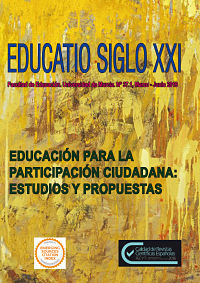Partners or Clients: Education for Citizen Participation in the Third Sector
Abstract
Citizen participation is a key to develop democratic societies which guarantee education for all. In this sense, the Third Sector for social and educational action is an essential scenario. However, there are operational problems arising from
the application of external evaluations on service excellence and quality. These problems are analysed to define the current state of the Third Sector and its educational implications, offering solutions and guidance for practice. Distribution of responsibilities for welfare, influence of external evaluation on the Third Sector, lack of citizen ability to participate in it, and challenges and functions of education within this framework are addressed. The results of the analysis highlight protecting the original meaning of the Third Sector, decentralising the influence of external evaluations and taking advantage of recent pedagogical trends. In addition, the conclusion points to the need for an alliance between formal education and the Third Sector to train empathic and morally autonomous citizens.
Downloads
-
Abstract775
-
PDF (Español (España))572
References
Addicott, K. (2017). There may be trouble ahead: exploring the changing shape of non-profit entrepreneurship in third sector organizations. Public Money & Management, 37(2), 81-88, doi:10.1080/09540962.2016.1266142
Arendt, H. (1998). The Human Condition. Chicago, IL: University of Chicago Press.
Booth, T. & Ainscow, M. (2015). Guía para la Educación Inclusiva. Desarrollando el aprendizaje y la participación en los centros escolares. Madrid: OEI y FUHEM.
Carl, J. (1994). Parental Choice as National Policy in England and the United States. Comparative Education Review, 38(3), 294–322. doi:10.1086/447254
Cooke, G. & Muir, R. (Eds.) (2012). The relational state. How recognising the importance of human relationships could revolutionise the role of the state. London: Institute for Public Policy Research.
Cortina, A. & Conill, J. (2001). Educar en la ciudadanía. Valencia: Instituto Alfonso el Magnánimo.
Daviet, B. (2016). Revisiting the Principle of Education as a Public Good. Recuperado de http://unesdoc.unesco.org/images/0024/002453/245306E.pdf
Dewey, J. (2002). Human Nature and Conduct. North Chelmsford, MA: Courier Corporation.
EFQM. (2017). EFQM Model. Fundamental concepts. Recuperado de http://www.efqm.org/efqm-model/fundamental-concepts
Escámez, J. & Gil, R. (2002). La educación de la ciudadanía. Madrid: CCS-ICCE.
Esping-Andersen, G. (1999). Social Foundations of Postindustrial Economies. New York, NY: Oxford University Press.
Freire, P. (2012). Pedagogía del oprimido. Madrid: Siglo XXI.
Giddens, A. (1999). The Third Way: The Renewal of Social Democracy. Hoboken, NJ: Wiley.
Howard, M. (1981). War and the liberal conscience. Oxford: Oxford University Press.
Iglesias, M. & Carreras, I. (2013). La colaboración efectiva en las ONG. Alianzas estratégicas y redes. Barcelona: Instituto de Innovación Social ESADE y Fundación PwC.
ISO. (2017). How we develope standards. Recuperado de https://www.iso.org/developing-standards.html
McCuaig, L., Enright, E., Rossi, A., Macdonald, D., & Hansen, S. (2016). An Eroding Social Justice Agenda: The Case of Physical Education and Health Edu-Business in Schools. Research Quarterly for Exercise and Sport, 87(2), 151-164. doi:10.1080/02701367.2016.1163978
Melão, N. F., Guia, S. M., & Amorim, M. (2016). Quality Management and Excellence in the third sector: examining European Quality in Social Services (EQUASS) in non-profit social services. Total Quality Management & Business Excellence, 28(7/8), 840-857. doi:10.1080/14783363.2015.1132160
Myers, J. (2017). To austerity and beyond! Third sector innovation or creeping privatization of public sector services? Public Money & Management, 37(2), 97-104. doi:10.1080/09540962.2016.1266152
Nussbaum, M. C. (2009). Frontiers of Justice: Disability, Nationality, Species Membership. London: Harvard University Press.
ONU. (1948). Universal Declaration of Human Rights. Recuperado de http://www.un.org/en/universal-declaration-human-rights/
Pérez-Pérez, C. (2016). Educación en valores para la ciudadanía. Estrategias y técnicas de aprendizaje. Bilbao: Editorial Desclée de Brower, S.A.
Peters, M. A. (2016). From State responsibility for education and welfare to self-responsibilisation in the market. Discourse: Studies in the Cultural Politics of Education, 38(1), 138-145. doi:10.1080/01596306.2016.116385
Pettit, P. (1997). Republicanism: A Theory of Freedom and Government. New York, NY: Oxford University Press.
Polanska, D. V. & Chimiak, G. (2016). Organizing without organizations: on informal social activism in Poland. International Journal of Sociology and Social Policy, 36(9/10), 662-679. doi:10.1108/IJSSP-11-2015-0120
Puig, J. M., Batlle, R., Bosch, C., & Palos, J. (2006). Aprenentatge Servei. Educar per a la cuitadania. Barcelona: Ediciones Octaedro S.L.
Sen, A. (1999). Development as freedom. New York, NY: Anchor Books.
Säfström, C. A. (2018). Liveable life, educational theory and the imperative of constant change. European Educational Research Journal, 17(5), 621-630. doi:10.1177/1474904118784480
Systeme Innovación y Consultoría. (2015). El Tercer Sector de acción social. Impacto de la crisis. Madrid: Systeme Innovación y Consultoría.
UNESCO. (2015). Rethinking Education. Towards a global common good? Paris: United Nations Educational, Scientific and Cultural Organization.
UNESCO. (2016). Implementing the Right to Education. A Compendium of practical examples. Paris: United Nations Educational, Scientific and Cultural Organization.
Vera-Toscano, E., Rodrigues M., & Costa, P. (2017). Beyond educational attainment: The importance of skills and lifelong learning for social outcomes. Evidence for Europe from PIAAC. European Journal of Education, 52(2), 217-231. doi:10.1111/ejed.12211
Weber, M. (2000). Basic Concepts in Sociology. New York, NY: The Citadel Press.
Original work publishes in this journal is subject to the following terms:
1. Murcia University Press (the publishing house) holds the copyright of the publishes work, and favours and allows their reutilization under the use license stated in point 2.
© Servicio de Publicaciones, Universidad de Murcia, 2015
2. Work is published in the electronic edition under a license (Creative Commons Reconocimiento-NoComercial-SinObraDerivada 4.0 España (legal text). They can be copied, used, disseminated, transmitted and publicly presented, as long as: i) authorship and original publication source is acknowledged (journal, publishing house and URL of the work); ii) are not used for commercial purposes; iii) the existence and specifications of this use license is stated.
3. Conditions for self-archive. Authors are allowed and encouraged to disseminate electronically the pre-pint (before review) and/or post-print (accepted for publication) versions of their work before their publication since that favours earlier circulation and dissemination resulting in an increased chance for the authors to be cited and for the work to reach a bigger share of the academic community. Colour: RoMEO: green.







